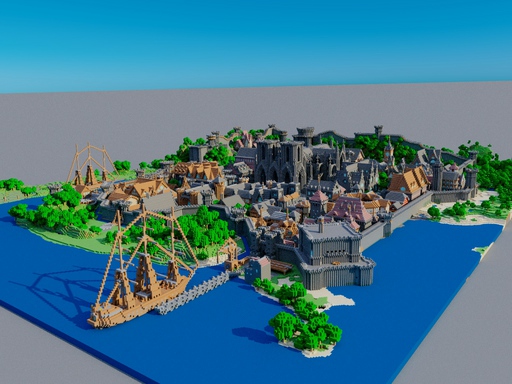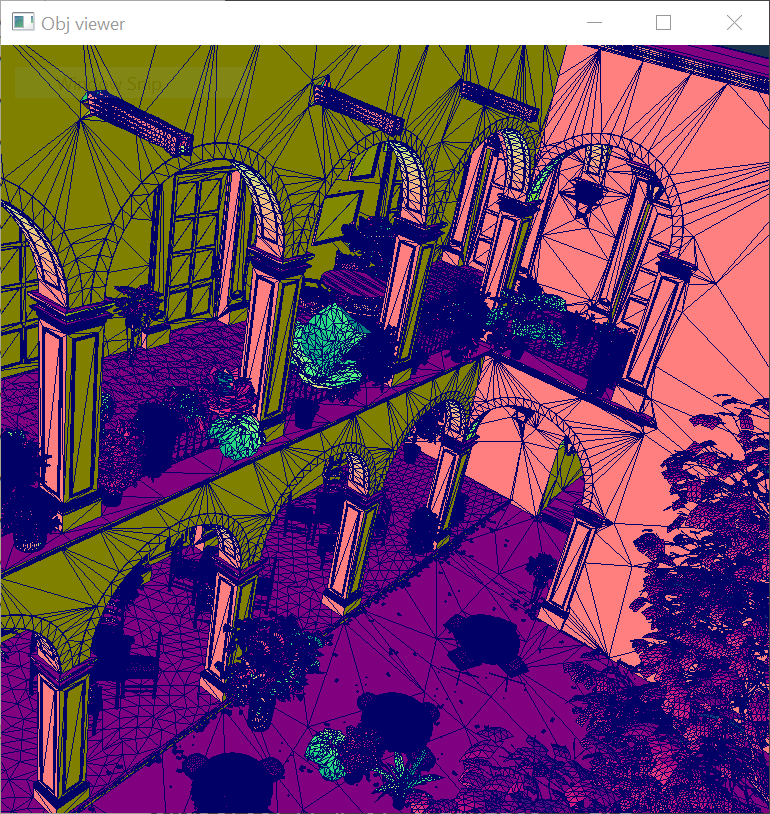http://syoyo.github.io/tinyobjloader/
Tiny but powerful single file wavefront obj loader written in C++. No dependency except for C++ STL. It can parse 10M over polygons with moderate memory and time.
tinyobjloader is good for embedding .obj loader to your (global illumination) renderer ;-)
If you are looking for C89 version, please see https://github.com/syoyo/tinyobjloader-c .
We have released new version v1.0.0 on 20 Aug, 2016.
Old version is available v0.9.x branch https://github.com/syoyo/tinyobjloader/tree/v0.9.x
- 20 Aug, 2016 : Bump version v1.0.0. New data strcutre and API!
Previous old version is avaiable in v0.9.x branch.
tinyobjloader can successfully load 6M triangles Rungholt scene. http://graphics.cs.williams.edu/data/meshes.xml
- examples/viewer/ OpenGL .obj viewer
- examples/callback_api/ Callback API example
- examples/voxelize/ Voxelizer example
TinyObjLoader is successfully used in ...
- Loading models in Vulkan Tutorial https://vulkan-tutorial.com/Loading_models
- .obj viewer with Metal https://github.com/middlefeng/NuoModelViewer/tree/master
- Your project here!
- bullet3 https://github.com/erwincoumans/bullet3
- pbrt-v2 https://github.com/mmp/pbrt-v2
- OpenGL game engine development http://swarminglogic.com/jotting/2013_10_gamedev01
- mallie https://lighttransport.github.io/mallie
- IBLBaker (Image Based Lighting Baker). http://www.derkreature.com/iblbaker/
- Stanford CS148 http://web.stanford.edu/class/cs148/assignments/assignment3.pdf
- Awesome Bump http://awesomebump.besaba.com/about/
- sdlgl3-wavefront OpenGL .obj viewer https://github.com/chrisliebert/sdlgl3-wavefront
- pbrt-v3 https://github.com/mmp/pbrt-v3
- cocos2d-x https://github.com/cocos2d/cocos2d-x/
- Android Vulkan demo https://github.com/SaschaWillems/Vulkan
- voxelizer https://github.com/karimnaaji/voxelizer
- Probulator https://github.com/kayru/Probulator
- OptiX Prime baking https://github.com/nvpro-samples/optix_prime_baking
- FireRays SDK https://github.com/GPUOpen-LibrariesAndSDKs/FireRays_SDK
- parg, tiny C library of various graphics utilities and GL demos https://github.com/prideout/parg
- Opengl unit of ChronoEngine https://github.com/projectchrono/chrono-opengl
- Point Based Global Illumination on modern GPU https://pbgi.wordpress.com/code-source/
- Fast OBJ file importing and parsing in CUDA http://researchonline.jcu.edu.au/42515/1/2015.CVM.OBJCUDA.pdf
- Sorted Shading for Uni-Directional Pathtracing by Joshua Bainbridge https://nccastaff.bournemouth.ac.uk/jmacey/MastersProjects/MSc15/02Josh/joshua_bainbridge_thesis.pdf
- GeeXLab http://www.geeks3d.com/hacklab/20160531/geexlab-0-12-0-0-released-for-windows/
- Group(parse multiple group name)
- Vertex
- Texcoord
- Normal
- Material
- Unknown material attributes are returned as key-value(value is string) map.
- Crease tag('t'). This is OpenSubdiv specific(not in wavefront .obj specification)
- PBR material extension for .MTL. Its proposed here: http://exocortex.com/blog/extending_wavefront_mtl_to_support_pbr
- Callback API for custom loading.
- Fix obj_sticker example.
- More unit test codes.
- Texture options
- Normal vector generation
- Support smoothing groups
Licensed under MIT license.
attrib_t contains single and linear array of vertex data(position, normal and texcoord).
Each shape_t does not contain vertex data but contains array index to attrib_t.
See loader_example.cc for more details.
#define TINYOBJLOADER_IMPLEMENTATION // define this in only *one* .cc
#include "tiny_obj_loader.h"
std::string inputfile = "cornell_box.obj";
tinyobj::attrib_t attrib;
std::vector<tinyobj::shape_t> shapes;
std::vector<tinyobj::material_t> materials;
std::string err;
bool ret = tinyobj::LoadObj(&attrib, &shapes, &materials, &err, inputfile.c_str());
if (!err.empty()) { // `err` may contain warning message.
std::cerr << err << std::endl;
}
if (!ret) {
exit(1);
}
// Loop over shapes
for (size_t s = 0; s < shapes.size(); s++) {
// Loop over faces(polygon)
size_t index_offset = 0;
for (size_t f = 0; f < shapes[s].mesh.num_face_vertices.size(); f++) {
int fv = shapes[s].mesh.num_face_vertices[f];
// Loop over vertices in the face.
for (size_t v = 0; v < fv; v++) {
// access to vertex
tinyobj::index_t idx = shapes[s].mesh.indices[index_offset + v];
float vx = attrib.vertices[3*idx.vertex_index+0];
float vy = attrib.vertices[3*idx.vertex_index+1];
float vz = attrib.vertices[3*idx.vertex_index+2];
float nx = attrib.normals[3*idx.normal_index+0];
float ny = attrib.normals[3*idx.normal_index+1];
float nz = attrib.normals[3*idx.normal_index+2];
float tx = attrib.texcoords[2*idx.texcoord_index+0];
float ty = attrib.texcoords[2*idx.texcoord_index+1];
}
index_offset += fv;
// per-face material
shapes[s].mesh.material_ids[f];
}
}
Optimized multi-threaded .obj loader is available at experimental/ directory.
If you want absolute performance to load .obj data, this optimized loader will fit your purpose.
Note that the optimized loader uses C++11 thread and it does less error checks but may work most .obj data.
Here is some benchmark result. Time are measured on MacBook 12(Early 2016, Core m5 1.2GHz).
- Rungholt scene(6M triangles)
- old version(v0.9.x): 15500 msecs.
- baseline(v1.0.x): 6800 msecs(2.3x faster than old version)
- optimised: 1500 msecs(10x faster than old version, 4.5x faster than baseline)
Unit tests are provided in tests directory. See tests/README.md for details.

